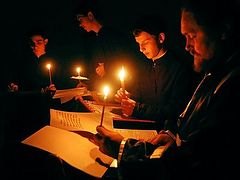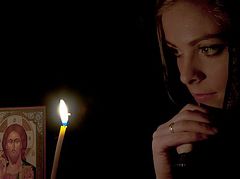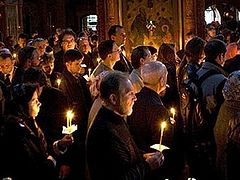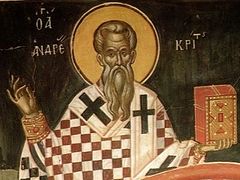The first week of Great Lent is a time of special prayer and strict abstinence. During the first four days—from Monday to Thursday—the Great Canon of Repentance of St. Andrew of Crete is read in nearly every Orthodox Church.
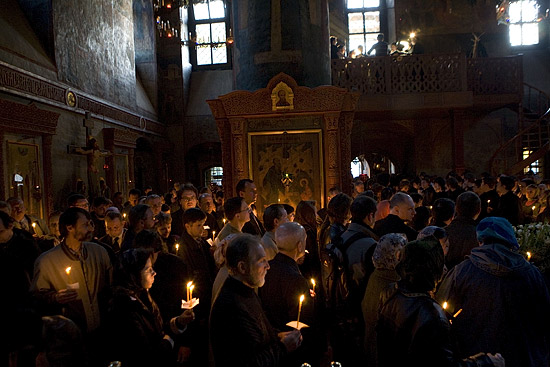 Lenten service in Sretensky Monastery. Photo by M. Rodionov, Pravoslavie.ru
Lenten service in Sretensky Monastery. Photo by M. Rodionov, Pravoslavie.ru
* * *
Igumen Nektary (Morozov), rector of the Church of the Icon of the Mother of God, "Assuage My Sorrow," Saratov:
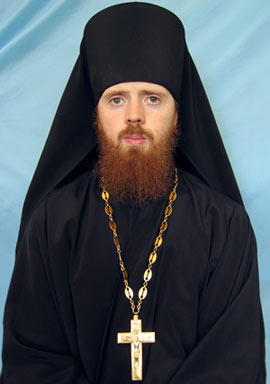
Often we can only be roused from this sleep, this state of false peace, by some serious trial—sickness or sorrow for which we are unprepared. For some, this awakening is death…
Great Lent is a time when we can shake off the shackles of sleep; a time when we can spiritually come to life, having listened once again to the kontakion of the Great Canon: "O My soul rise up, why art thou sleeping? The end draws near…" This is a time when we can make ourselves stop, interrupt the endless, daily rush, look into the state of our heart, understand how far we are from God, from the ideal to which He calls us unceasingly…
This time, when the heavens open for us, is a time when the pain of repentance can most sting our soul and urge it to seek again for that freedom from sin and passions that can heal this pain. The Lord is so close to each penitent during these days…
So little is asked of us! Just to break away from everyday affairs, come to church in the evening, and let your soul drink in the words of the pastor of Crete [St. Andrew] like the parched earth drinks in the rain. Resolve to do what your soul, awakening and coming to life, will more and more insistently demand of you.
Archpriest Igor Shestakov, head of the youth department of Chelyabinsk diocese, rector of the Holy Trinity Church, Chelyabinsk.
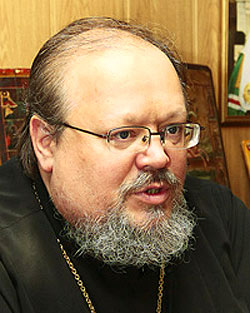
Now, having served for two decades at the altar of the Lord, I impatiently await the Lenten melodies, the Great Canon of St. Andrew of Crete, the three-canticled canon, and the prayer of St. Ephraim the Syrian. Someone might ask, "What else is there for a priest to do?" Others might exclaim, "We have no time to pray and fast; those long services are difficult and hard to understand. We live with the problems of today, we get tired and irritated. Leave us alone with your fasts—we don't have enough to eat anyway!" What can I say to that? Should I begin the mentor's rhetoric that is little accepted even by a church-going audience? Or remind the people that they are patently ignorant?
Our problem is that we do not look at the essence of the fast as a freewill act of love for God. In general, we speak very little about free will, freedom in truth and love. We should feel the need for fasting, we should want to fast in repentance, humility, and self-restraint, without condemning those who behave differently during these holy days. Then the world of chant and prayers directed at us will suddenly be understood. A person can feel that he is spiritual when he takes up arms and wars against idleness, despondency, ambition, and vain talk. Against laziness and sluggishness of soul. Against fatness and slackness of spirit. This is a passionate work, and only those to want to be a Christian not only in word but also in deed will resolve to do it. Here we need all our Christian courage and our will. If not, then it means we have made peace with our slavish habits, inclinations, and passions, and we don’t dare to challenge them.
Today, fasting is an open challenge to hedonistic morals, consumerism, spiritual indifference, and egoism. This is a war, a battle, a test of the strength of our faith, the firmness of our hope, and the strength of our love. Who of us wants to be struggler and good warrior of Christ? Enter the open doors of the church, and stand amongst those whose spirit keeps vigilance and rejoices over the enlivening Holy Forty Days Fast!
Archpriest Vasily Mazur, rector of the St. Sergius Church in the regional hospital of Cherson, associate professor of the department of ecology and geography at Cherson State University.
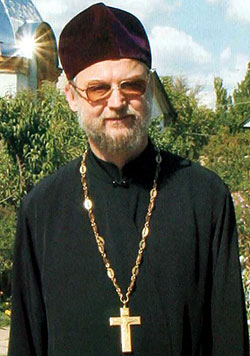
We cannot become perfect after a single Lent, but we can and must come closer to perfection, if only by a step, after every Lent. The fast from foods is according to the strength of each Christian, but the measure of austerity is different for different people. There is one measure for monks and clergy, another for laypeople. The ability to fast comes with time from one Lent to another.
The fast should not become the source of arguments in a family, when one of the spouses has not yet come to see a need for fasting while the other fasts sincerely. The fast should bring joy, and not sorrow. Prayer during the fast, combined with meekness and patience, can raise the relationship between spouses to a new level.
Attending the Lenten services, which are so touching and contrite, is not so much an obligation as the demand of a repentant soul. But, of course, there should never be any conflicts at work or home because of them.
Priest Vladimir Voitov, clergyman of the Church of the Nativity of Christ, Obninsk:
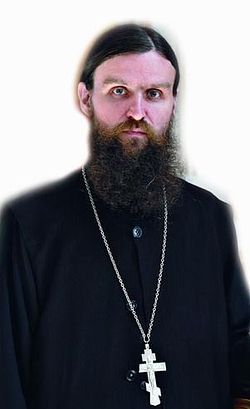
What rule should we follow? The first rule we should begin with is categorically to refuse television and internet (except at work) for the whole fast, until Pascha. We can only watch some Orthodox Christian programs, [or visit Orthodox Christian websites].
Second: it is necessary to abstain from going to parties in principle throughout the fast, because there will unfailingly be temptations—not only to eat what we shouldn't, but also to laugh and joke. I take the position that we should not beat around the bush, but rather openly tell whoever is inviting us that this is the time of Great Lent, the most sorrowful of all the four yearly fasts, because it is dedicated directly to the sufferings of Christ, the Sacrifice on the Cross, for which God became incarnate in the world. We fast for the sake of Christ's sufferings, restraining ourselves. The whole Orthodox world is fasting, and we do so together with them, and therefore we do not go out visiting…
Other nominal parishioners, who look quite healthy, come and ask for a relaxation of the fast during the very first days. They complain of gastritis, saying, "Bless me to relax the fast." "What do you want to eat?" I ask. "Meat or milk," they reply. I know several people with stomach ulcers who observe Great Lent. They say that their health does not suffer at all from it; to the contrary, they feel better.
For pregnant, nursing mothers, children, the aged and infirm, the fast is relaxed sometimes to zero. Those who do heavy physical work should also fast less. A person should feel it out: if he feels that the body is being exhausted beyond measure, then he should consult with a priest and reassess his Lenten rations.
The fast should not lead to a state of despondency or sadness. "Let us keep a pleasing fast," we sing in the stichera. Pleasing not in the sense of food, but in the sense of a profitable influence on the soul. If it is not that way, then we need to change it.
Fasting is an exercise in restraint, a small ascetic labor, which we can bear. Exercise in restraint cultivates sobriety; that is, attention to ourselves, the ability to rein ourselves in, control our emotions and feelings.
It is very helpful to read patristic literature (especially the works of St. Ignatius Brianchininov)[1]. We should determine a norm for ourselves: one page or ten pages. This reading refreshes the soul.
The maximum prayer program for the first week is to attend all the services, morning and evening.
In general, it is necessary for the layperson, considering his life circumstances, to go to the services as he sees fit. Everyone has his measure of exercising restraint, and therefore age, health, and workload should all be taken into consideration. It is good during Great Lent to have, at least during the first week, a small, separate rule during midday; for example thirty Jesus prayers and five full prostrations. However, this rule should be performed as the holy fathers teach: unhastily, with attention and reverence. Why midday? Because we always pray in the morning and evening, either at church or at home. But midday is when we are most caught up in activity. We need to break it and turn our attention to God—just spend a few minutes of quiet prayer with this short prayer of Jesus. This remembrance of God, this restoration of our connection with Him, this repentance before Him, will definitely bring the peace of Christ to our souls. Anyone who has ever done this knows what a benefit it brings.

